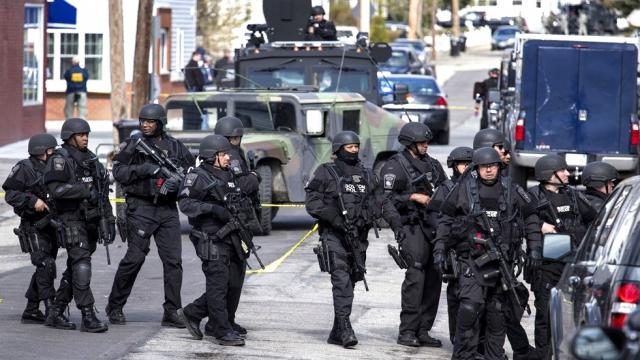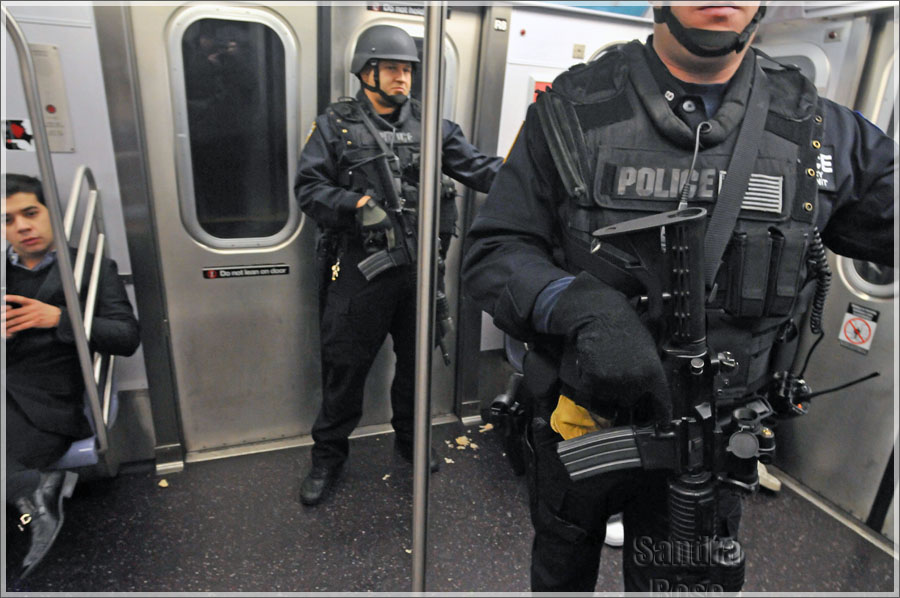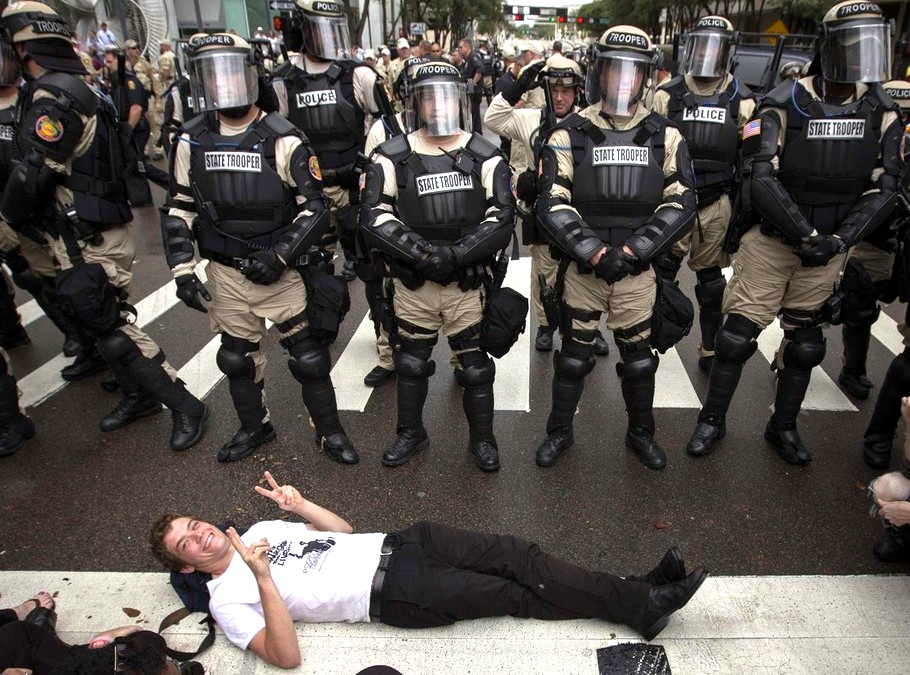
At 3 a.m. on May 28, Alecia Phonesavanh was asleep in the room she was temporarily occupying together with her husband and four children in the small town of Cornelia, Georgia. Her baby, 18-month-old Bou Bou, was sleeping peacefully in his cot.
Suddenly there was a loud bang and several strangers dressed in black burst into the room. A blinding flash burst out with a deafening roar from the direction of the cot. Amid the confusion, Phonesavanh could see her husband pinned down and handcuffed under one of the men in black, and while her son was being held by another. Everyone was yelling, screaming, crying. “I kept asking the officers to let me have my baby, but they said shut up and sit down,” she said.
As the pandemonium died down, it became clear that the strangers in black were a SWAT team of police officers from the local Habersham County force – they had raided the house on the incorrect assumption that occupants were involved in drugs. It also became clear to Phonesavanh that something had happened to Bou Bou and that the officers had taken him away.
“They told me that they had taken my baby to the hospital. They said he was fine he had only lost a tooth, but they wanted him in for observation,” Phonesavanh said.
When she got to the hospital she was horrified by what she saw. Bou Bou was in a medically-induced coma in the intensive care unit of Brady Memorial hospital. “His face was blown open. He had a hole in his chest that left his rib-cage visible.”
The SWAT team that burst into the Phonesavanh’s room looking for a drug dealer had deployed a tactic commonly used by the U.S. military in war zones, and increasingly by domestic police forces across the US. They threw an explosive device called a flashbang that is designed to distract and temporarily blind suspects to allow officers to overpower and detain them. The device had landed in Bou Bou’s cot and detonated in the baby’s face.
“My son is clinging to life. He’s hurting and there’s nothing I can do to help him,” Phonesavanh said. “It breaks you, it breaks your spirit.”
Bou Bou is not alone. A growing number of innocent people, many of them children and a high proportion African American, are becoming caught up in violent law enforcement raids that are part of an ongoing trend in America towards paramilitary policing.
The American Civil Liberties Union has released the results of its new survey into the use of SWAT teams by police forces across the country. It concludes that policing has become dangerously and unnecessarily militarized, literally so with equipment and strategies being imported directly from the U.S. army.
The findings set up a striking and troubling paradox. The Obama administration is completing its withdrawal from Afghanistan, and the U.S. is on the verge of being free from war for the first time in more than a decade; yet at the same time the hardware and tactics of the war zone are quietly proliferating at home.
The ACLU’s report, War Comes Home, looks at 818 SWAT incidents that were carried out by more than 20 law enforcement agencies in 11 states. The raids spanned the period from July 2010 to last October.
At the very least, the ACLU finds, the growing use of battering rams to smash down doors is causing property damage to the homes that are raided. At worst, people are dying or being injured by police teams deploying the techniques of the battlefield.
The survey, which covered only a small snapshot of what is going on around the country each year, found seven cases where civilians died in connection with the deployment of the SWAT teams, two of which appeared to be suicides. A further 46 civilians were injured, often due to use of force by officers.
The victims include Aiyana Stanley-Jones, seven, who was killed in 2010 when a SWAT team threw a flashbang grenade like the one that injured Bou Bou into the room where she was sleeping. The device set fire to Aiyana’s blanket and when officers burst into the room they shot at the flames and hit her.
Then there was Tarika Wilson who was shot dead by SWAT officers as she was holding her 14-month-old son in Lima, Ohio; the baby was injured but survived. And Eurie Stamp, a grandfather of 12, who was sitting watching baseball on TV in his pajamas in Farmington, Massachusetts, in January 2011 when a SWAT team battered down his door, threw a flashbang device into the room and forced him to lie facedown on the floor. One of the officers’ guns discharged and killed Stamp, who was not the man they had come to apprehend, as he lay there.
Also in 2011, Jose Guerena, a veteran of the Iraq war, was shot 22 times in his kitchen at home in Tucson, Arizona, by officers in a SWAT team that was searching the neighborhood for drugs. Nothing was found in the Guerena home.
SWAT teams were a late 1960s invention that emerged out of the Los Angeles police department. Initially, they were designed to help officers react to perilous situations such as riots, hostage taking and where an active shooter was barricaded into a house.
But they have developed into something entirely different. The ACLU survey found that 62% of SWAT team call-outs were for drug searches. Some 79% involved raids on private homes, and a similar proportion were done on the back of warrants authorizing searches. By contrast, only about 7% fell into those categories for which the technique was originally intended, such as hostage situations or barricades.
“Law enforcement agencies are increasingly using paramilitary squads to search people’s homes for drugs,” the ACLU writes. It adds: “Neighborhoods are not war zones and our police officers should not be treating us like wartime enemies.”
Research by Peter Kraska, a professor at Kentucky University, has tracked the exponential growth in the use of paramilitary tactics in the US. In the 1980s there were as few as 3,000 SWAT raids a year, but by around 2005 that number had leapt to 45,000.
Such a rapid proliferation has been actively encouraged by the federal government, particularly by the Department of Homeland Security after 9/11, and by the Defense Department. The Pentagon channels military equipment used in Iraq and Afghanistan to domestic police forces under its 1033 program, which the ACLU found had transmitted 15,000 items of battle uniforms and personal protective gear during the survey period.
The amount of equipment handed over can be substantial. North Little Rock police force in Arkansas, for instance, was granted 34 automatic and semi-automatic rifles, two MARCbot robots from Afghanistan that can be weaponized, helmets for ground troops and a tactical armored vehicle.
Armored personnel carriers, or APCs, have proliferated dramatically under the 1033 program. About 500 law enforcement agencies believed to have received military vehicles built specifically to resist roadside bombs. The local police for Ohio state university even has an APC for use on American football match days.
Once the equipment has been handed over, the temptation is to use it. That certainly was the case for the mayor of Peoria, Illinois, who in April sent a SWAT team to search the house of someone who had poked fun at him in a satirical Twitter account.
As the ACLU notes: “if the federal government gives the police a huge cache of military-style weaponry, they are highly likely to use it, even if they do not really need to.”
As for the infant, Bou Bou Phonesavanh, he remains in intensive care after having been through a series of operations. “Everything is touch and go. Nothing is determined, nothing is decided,” Alecia Phonesavanh said.
The Phonesavanhs’ lawyer, Mawuli Davis, said the SWAT team should have known that young children were present in the room they were raiding as there were clear tell-tale signs: a playpen outside the door and a van parked outside with four child seats in it. “We have to address the way that police in this country are armed as if they are invading a foreign land,” Mawuli said. “It’s disturbing, and innocent people are hurting.”
A few hours after the raid took place, police located the suspect they had been seeking at a different house in the neighborhood. The officers knocked on the door, the suspect opened it, and agreed peacefully to come in for questioning.
3 WAYS TO SHOW YOUR SUPPORT
- Log in to post comments















